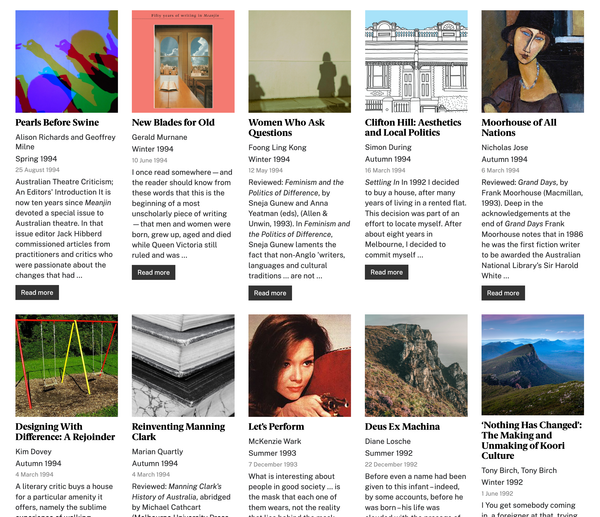Boundless Risk
On creative business models, risk, and the Unbound fiasco
I can't be the only one to have become familiar with the publisher Unbound via the excellent literary podcast Backlisted. After a leisurely start to each episode, the hosts introduce themselves. I'm Andy Miller yadayadayada – and I'm John Mitchinson, the founder and publisher of Unbound.
Backlisted devotes long episodes to digressive, extremely entertaining discussions of books whose publication dates have receded into the horizon. The tagline is 'Bringing New Life to Old Books'. I can't say I've listened to every single episode of Backlisted, but every six months or so I'll go on a binge to catch up on whatever looks good. You can happily hop around the archive, going from Muriel Spark to George Gissing to Annie Dillard to Lawrence Sterne. The bias is definitely towards white British writers, and towards twentieth century fiction. Andy and John natter away about the books that they're reading before bringing their guests on mike, usually a writer and an academic, and roping in their long-standing producer, Nicky Birch, for a chat. A very charming combination of enthusiasm and expertise drives the discussions on Backlisted, which go on and on and on, a nice counter to the snack-sized servings of much cultural media. It's taken for granted that everyone involved loves the books that they are discussing, and there's time for a lot of this discussion, as well as plenty of guffawing, emoting and hyperbole. The production values have gone up since I started listening, but the show has retained a kind of dorky vibe that I like. My guess is that a good percentage of Backlisted fans are able to complete on cue punchlines from each season of Blackadder.
Most cultural media is, in some way or another, in thrall to the sales and publicity imperatives of publishers. Interviews, features, reviews, they are almost always tied to schedules of new releases. Backlisted guests generally don't have books to sell and the books under discussion are, obviously, from the backlist. (That said, I got a jolt when, hoping for witty banter about old Hollywood as I made soup or somesuch, I clicked on an episode featuring Rupert Everett on David Niven's The Moon is a Balloon, only to find the introduction was basically a lengthy puff for Everett's new memoir. I would say that's an exception rather than a change of direction.) Anyway, Backlisted models a reading life that I recognise, and I've always thought of it as an antidote to the relentless hype that shapes so many public literary spaces, cherishing its clumsiness.
In spite of this attachment to Backlisted, I'd managed to miss the news that's been circulating for the past several months about the collapse of Unbound.
In brief: Unbound, which launched in 2011, was until recently a publisher, co-founded by John Mitchinson, that operated on a crowdfunding model. Everyone who has donated to a Kickstarter or GoFundMe knows how this works. Unbound published a ton of books, and it turns out, also launched Backlisted as a side project. The podcast has been independent of Unbound for over five years, apparently - but that's where it started. Some of the books sold handsomely, won awards and earned incomes for their authors. The list is heavy on game culture, with quite a lot of fantasy and spec fic, as well as books for fans of certain TV shows. I've always had my doubts about crowdfunding as anything but a temporary answer to the larger question of how to build sustainable cultural infrastructure - more on that later - but from the outside, it all seemed to be ticking along.
It's now not possible to browse the Unbound backlist because the business has, in the past twelve months, gone spectacularly belly-up. Unbound went into administration in March and the company's assets were sold to a new entity, Boundless, run by the same management team. The company stopped paying royalties to authors, and later halted production on books that had been funded, leaving them effectively in debt not only to writers, but to readers.
I'm cobbling my commentary from reportage undertaken by others, especially by Lucy Knight at The Guardian and Dominic Bernard at Printweek, both of whose reports followed the announcement that Unbound was going into administration. The transformation of Unbound into Boundless looks like a classic predatory corporate restructure. In spite of the cashflow problems and crisis rhetoric, the management and staff of the company remained (though many staff have now left), and the risk was shunted onto vendors (ie writers) and investors (ie readers), although all involved assured the public that the show would go on.
The news has exploded again over the last week or so, and I've been tracking the extremely pissed-off commentary on Bluesky, Reddit and author newsletters. There's good recent reportage by Ed Nawotka in Publishers Weekly. If you've been following the story, skip the rest of this par. If not, strap in. Authors have been informed that they won't be paid their royalties until the company becomes cash stable, which means, possibly never. Some 238 authors and agents are owed £657,000, 8000 customers who pre-ordered books £391,000 and other creditors £829,000. (Those figures are from PW, btw.) What a fuck-up! No one seems to know where the royalty monies went, exactly, and there are pretty clear signs of careless (generous) or stupid (fair) financial management, in that income generated by crowdfunding went into setting up new ventures, including a magazine, rather than into operations and production. The Times is reporting that over £1 million was invested in, wait for it, a machine learning tool that, take another breath, was never used. The CEO of Boundless, Archna Sharma, who was brought in as Unbound CEO early in the year, has basically disavowed the crowdfunding model and stressed that she's dealing with a mess she inherited, rather than created. Convenient! Mitchinson has left the company without a payout. Staff have quit and there's still a long list of releases slated for publication in 2025/26. If Boundless goes to ground, as well it may, those authors will not get their royalties.
Business as usual, and an absolute shitshow for the writers, one involving real losses, not potential ones. Reddit boards are abuzz with readers confused about whether their pledges will be honoured, very angry authors, and the requisite cohort of wise guys who knew all along that Unbound was a scam. The jury is out on whether Mitchinson is a mensch or a menace.
The British publishing scene is not my scene and I'm far, far from the gossip of London publishing. Though I've supported countless crowdfunding initiatives for books, gigs, magazines and so on, I've never bought a book from Unbound. Even so, the contours of this particular mess are very familiar to me, and I think have significance beyond the immediate blast zone.
That is because for at least the past fifteen years, probably longer, artists, writers, editors, have been encouraged to think of themselves as entrepreneurs, and so has anyone running an organisation in the creative sector. This is part and parcel of the neoliberal reconfiguration of the arts as creative industries. Existing audiences are assets to leverage, and so is IP. Audiences are investors. Artists are brands. Reputation is income. In strife? Innovate! This kind of language has become ubiquitous, and is mandatory for business plans and grant applications. We are told to identify our assets, to leverage them, to know that we can never rely on grant funding, to demonstrate that we can be nimble, responsive, and adapt quickly to market demands. We are told that our organisations must grow in order to remain relevant: bigger audiences, bigger programs, more income, more stuff. Organisations need to show they can do more with less, that they are resilient. To remain small and independent is to court irrelevance.
Unbound epitomises the plucky neoliberal cultural organisation: it did all these things that we've been told we need to do to. Its unravelling provides an object lesson in the limits of cultural entrepreneurialism, especially when it scales up fast. Much of the commentary on Unbound points to too-rapid growth: too many books, too many contractors, not enough management expertise. It's a cultural organisation that was run like a start-up, convinced that growth, the market and innovation would carry the day and that debts would eventually fall away.
There are circumstances where crowdfunding is an extremely useful tool for funding creative work: for one-off initiatives and for emergencies. In the interest of full disclosure I should add that I was involved in two very large crowdfunding campaigns for the website New Matilda in 2010 and 2011, in a very different news media landscape (pre Guardian Australia, for eg). We called it crowdfunding, but those campaigns took as their model public radio subscriptions, and funds raised were for operational funding, rather than for particular publication items.
Even though they use the same platforms, there is a distinction to be drawn, I think, between pay-in-advance crowdfunding models and subscriptions or Patreons. The latter are predicated on regular contributions to keep an organisation or an individual going. Crowdfunding, at least the way Unbound was doing it, is hypothecated funding, oriented towards a single product. The only way to build an organisation around it is through creative accounting and extremely disciplined financial management; building a publishing business over more than a decade around crowdfunding single books sounds – at best – challenging to me. And it is, as the Unbound case study shows us, highly fraught in that it reallocates risk to the author and customer. Where in traditional publishing models, by contrast, acquisitions teams take risks on authors, here the author takes a risk on their choice of publisher, the reader takes a punt on both. And before they've written their books, pressure on artists to build and mobilise their networks is intense. Yes, plenty of writers have found a way to be self-publishing entrepreneurs, building their audiences and income via Substack and other newsletter platforms, Patreons and so forth – but it's no way to run a business, especially not one that purports to support artists.
There's also the derogation of editorial decision-making to the market. A publisher funded book by crowd-funded book effectively cedes editorial discretion to the market. A book that isn't funded in advance by readers doesn't go to press. Editorial judgement counts for nought, nor do reviews, awards, public appearances or other modalities for audience development. Sure, conglomerate publishers and indeed most independent publishers make sales-driven editorial acquisitions – but Unbound presented itself as an alternative way of doing business. Not only was it sales-driven, when it hit cashflow problems, the company was effectively stripped for parts and repackaged; less an alternative to neoliberalism, than an emblematisation of its values. Folks on Reddit are speculating that the backlist of Unbound will be used to train LLMs – who knows whether this is true or not, but it's a salient reminder of how venture capital understands the value of literature.
Traditional publishing doesn't always serve authors well, everybody knows this. And we can recite together the threats to publishers large and small: Amazon, AI, distracted readers, print costs, censorship, on it goes... What the Unbound fiasco shows us is that a highly market-sensitive, growth-hungry approach does not help artists or the culture. We cannot innovate our way out of this by finding more inventive ways to screw artists and wring money out of the enthusiastic audiences that remain. I hope the lesson that is taken from this sorry episode is about the wrongheadedness of neoliberal entrepreneurialism in the cultural sector. In the Australian context, we need to hear less about innovative business approaches and more about meaningful public support of the arts, support of writers, publishers and readers.
And what of Backlisted? John Mitchinson has, as of a few days ago, stepped away from the podcast and new episodes are in production. I thought that Backlisted was an alternative to the PR dominated main channels of public literary culture, a gentle alleyway where artists, scholars and enthusiasts gathered to talk about books. Maybe it still is – but the demise of Unbound shows us how beguiling, and how dangerous, the fantasy of frictionless alternatives to corporate publishing can be.
*
I want to commend Michelle de Kretser's brave and necessary Stella acceptance speech to anyone who hasn't yet encountered it. It's quicker to read the transcript, of course, but I implore you, if you haven't already, to take the time to watch the speech, to listen as de Kretser talks about her fear of speaking up about the suffering of the women and girls of Gaza.
All the time I was writing these words, a voice in my head whispered, You will be punished. You will be smeared with labels as potent and ugly as they’re false. Career own goal, warned the voice.
Many of you will be familiar with that voice, and its seductive message of acquiescence and self-preservation. It urged me to offer you an uplifting narrative about female solidarity – I could tell you about some of the fantastic women who’ve inspired and supported me. Or I could speak to you about the creativity of Australian women, and add a little marketing plug for myself and my fellow writers, asking you to support us by buying our books.
Unlike the women and girls of Gaza, I’m not brave. Fear is a formidable and insidious opponent. It convinces us to censor ourselves, to obey in advance, to down the Kool-Aid before it’s been offered. I’m still afraid. But I’ve just accepted a prize that is not about obedience. It’s not about feel-good narratives, it’s not about marketing, it’s not even about creativity – Stella is about changing the world.
I know this fear. We all do. The disincentives to speak out about the genocidal intent of Netanhayu and the Israeli government are many. And yet in naming Israel as the perpetrator of harrowing, relentless and illegal violence against Palestinians (unlike the author of this vacuous column), de Kretser shows us that it is possible to be afraid and still to speak up. It's easy to forget the moral imperatives of art when we're drowning in exhortations to self-brand, to self-market, to self-leverage – and I'm grateful to de Kretser for her brave and eloquent leadership.
*
Other stuff: I reviewed Toby Schmitz' wild debut novel, The Empress Murders, for Guardian Australia.
Donate to the Palestinian Children's Relief Fund here.


